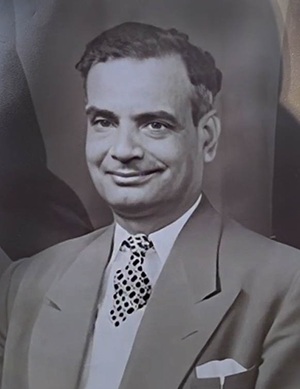A commemorative plaque honouring Ayub Ali Master, a pioneering figure in British Bengali history, has been unveiled on Christian Street, near the site where he and Shah Abdul Majid Qureshi ran the Indian Seamen’s Welfare League office in 1943.
Ayub Ali Master played a vital role in supporting South Asian seamen and migrants in East London during the early 20th century. His work laid the foundations for community organising and welfare support that benefited generations of British Bengalis.
Born in 1900 in Sylhet, Ayub Ali Master settled in East London in the 1920s and opened the Shah Jalal restaurant on Commercial Street which served as a hub for the Asian community. His home at 13 Sandys Row became safe havens for lascars - Bengali sailors escaping harsh conditions and contractual restrictions.

Ayub Ali provided shelter, food and practical assistance, helping them register with authorities and access essential services. In 1943, he co-founded the Indian Seamen’s Welfare League on Christian Street to formalise this support.
The unveiling was managed by Tower Hamlets Council as part of its historic Plaques Scheme, launched in 2013 to commemorate people, places and events of local significance. Through the scheme, residents were invited to nominate candidates for a Tower Hamlets People’s Plaque. Ayub Ali Master received the highest number of valid votes.
A total of eight plaques have been installed across the borough through the initiative, including those for Tasadduq Ahmed, Marge Hewson, Nicolas Culpeper, Alfred Hitchcock, Tommy Flowers, Sowabullah Munshi, and Clara Grant.
The unveiling was attended by Master Ayub Ali’s granddaughter, Parul Husain, and community representatives, including members of the Swadhinata Trust.
Parul Husain, granddaughter of Master Ayub Ali, attended the unveiling with family members and said:
“Our family are immensely proud and excited about this historic event. Our grandfather was an early Bangladeshi pioneer. He arrived in London in 1919. He aided so many people in the Bangladeshi community when they first arrived in the UK, as he was fluent in English and Bengali. He also worked tirelessly for social justice via the Indian Seaman's Welfare League during the 1940s.”
Julie Begum, Chair of the Swadhinata Trust, said:
“The Swadhinata Trust was formed in 2000 to promote British Bengali history and culture, ensuring it is recognised as an essential part of British history and, by extension, our contemporary world. As we mark our 25th anniversary, we are proud to support the unveiling of the plaque for Ayub Ali Master in Tower Hamlets. The Bengali community has long campaigned for recognition of Mr Ayub Ali Master’s contributions, both to London and internationally. He provided invaluable support to local people in need, long before the establishment of the British welfare state.”
The Swadhinata Trust has recently launched their free Bengali heritage walks where people can learn more about the work of Master Ayub Ali.
Executive Mayor of Tower Hamlets, Lutfur Rahman, said:
“Ayub Ali Master was a trailblazer whose tireless efforts laid the groundwork for community welfare in the borough and earned him deep respect as a trusted leader and advocate. His legacy continues to inspire generations, and it is fitting that we honour his contribution with a permanent plaque in the heart of our borough.
“It is especially meaningful that the plaque has been installed in close proximity to the Town Hall, a place that represents civic leadership and public service. This tribute is both symbolic and accessible to all.”
Those who want to view the plaque in real life can find it on Christian Street, on the side of Drewett House.
Posted on Wednesday 26th November 2025